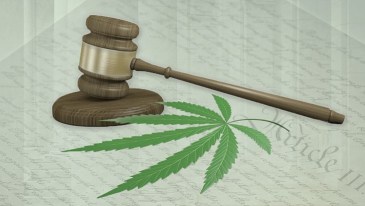
The National Organization for the Reform of Marijuana Laws (NORML), Empire State NORML, the New York City Cannabis Industry Association (NYCCIA), the Hudson Valley Cannabis Industry Association (HVCIA), and the New York City Cannabis Bar have filed a Friend-Of-The-Court Brief with the United States Supreme Court in the case of Washington v. Barr – which challenges the constitutionality of cannabis’ Schedule I prohibited status under federal law.
Originally filed in 2017 by a legal team that includes New York attorney Michael Hiller, NORML Legal Committee member and Board Member Joseph Bondy and Empire State NORML Director David Holland, the lawsuit contends that the federal government “does not believe, and upon information and belief never has believed” that cannabis meets the requirements for a Schedule I designation under the Controlled Substances Act. It further argues that current administrative mechanisms in place to allow for the reconsideration of cannabis Schedule I classification are “illusory.”
Lawyers for the Justice Department previously argued for a dismissal of the suit, which they were granted by a federal court judge in 2018, opining, “There is no fundamental right to use marijuana, for medical purposes or otherwise.”
In its amicus brief filed this week, NORML Legal Committee member David Holland, Esq., argues that the federal scheduling of cannabis is unconstitutional because all three branches of government have promoted laws and policies in direct conflict with its Schedule I status.
Holland said: “The Brief exposes a fundamental paradox – if cannabis is federally illegal for all purposes, and the three coordinate branches of federal government have acted to allow for cannabis businesses, then the federal government is nullifying its own law. Simply put, under the Constitution, something cannot be illegal and legal at the same time especially when it comes to state laws that conflict with federal laws. The only resolution to this constitutional conflict is for the Supreme Court to invoke the doctrine of estoppel to prevent the federal government from reversing course and retroactively penalizing that which it has protected in fostering state cannabis programs and effectively legalizing it.”
He added: “Federal precedent exists for the Court to invoke the doctrine and Attorney General William Barr has testified before Congress about his belief that it would be fundamentally unfair to penalize those who in good faith relied upon those government statements and policies because it would violate Due Process. Due Process and fairness are the very heart of the reasoning for the Court to invoke the doctrine of estoppel.”
Plaintiffs in the suit include a former NFL football player, a disabled military veterans, two children with severe movement disorders, and the non-profit group, the Cannabis Cultural Association. Plaintiffs argue that federal prohibition violates their civil and constitutional liberties, including their right to freely travel within the United States. They also argue that the federal prohibition of cannabis is “grounded in discrimination and [is] applied in a discriminatory manner.”
The full text of NORML’s brief is available here.











